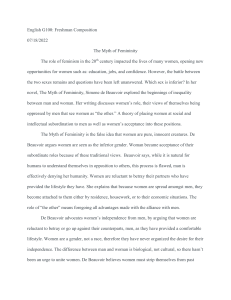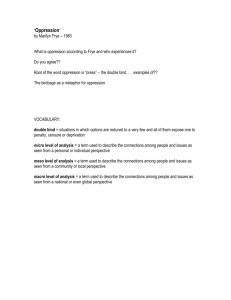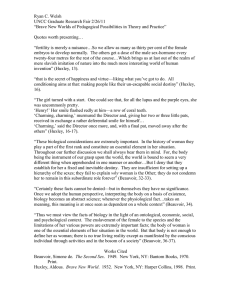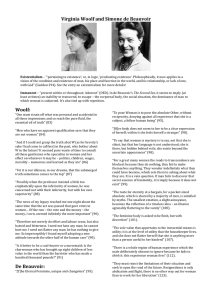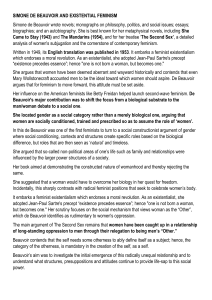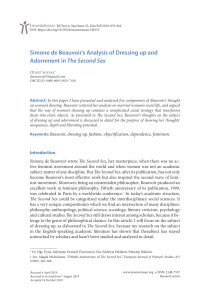Existentialism - Take Home Exam - Beauvoir
advertisement
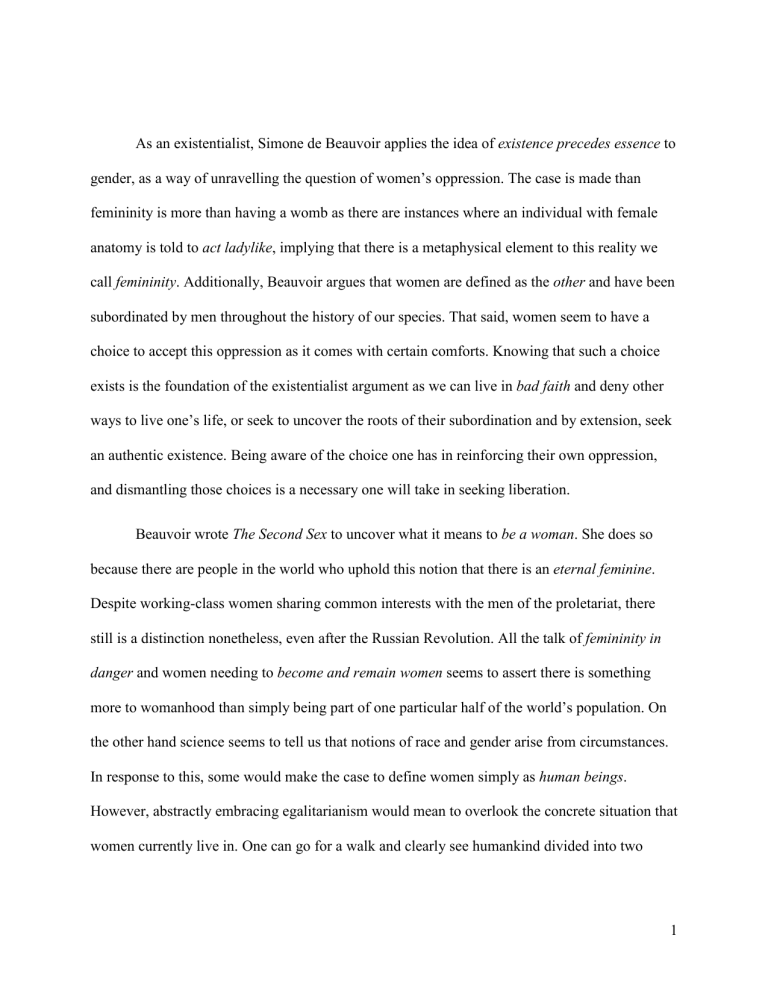
As an existentialist, Simone de Beauvoir applies the idea of existence precedes essence to gender, as a way of unravelling the question of women’s oppression. The case is made than femininity is more than having a womb as there are instances where an individual with female anatomy is told to act ladylike, implying that there is a metaphysical element to this reality we call femininity. Additionally, Beauvoir argues that women are defined as the other and have been subordinated by men throughout the history of our species. That said, women seem to have a choice to accept this oppression as it comes with certain comforts. Knowing that such a choice exists is the foundation of the existentialist argument as we can live in bad faith and deny other ways to live one’s life, or seek to uncover the roots of their subordination and by extension, seek an authentic existence. Being aware of the choice one has in reinforcing their own oppression, and dismantling those choices is a necessary one will take in seeking liberation. Beauvoir wrote The Second Sex to uncover what it means to be a woman. She does so because there are people in the world who uphold this notion that there is an eternal feminine. Despite working-class women sharing common interests with the men of the proletariat, there still is a distinction nonetheless, even after the Russian Revolution. All the talk of femininity in danger and women needing to become and remain women seems to assert there is something more to womanhood than simply being part of one particular half of the world’s population. On the other hand science seems to tell us that notions of race and gender arise from circumstances. In response to this, some would make the case to define women simply as human beings. However, abstractly embracing egalitarianism would mean to overlook the concrete situation that women currently live in. One can go for a walk and clearly see humankind divided into two 1 classes with distinct clothing, bodies, faces, occupations etc. These appearances may be superficial, but they certainly do exist. In order to understand what woman is, it is worth considering the fact than a man never has to state that he is a man (aside from situations in which one is emasculated). The key idea is that man and woman are equals only in formality; in all other cases, man is the neutral and allencompassing, while woman is the exception and the deviant. In a heated conversation, a man may accuse of woman of thinking in a certain way “because she is a woman”, and she can only reply by saying “I think so because it is true”. It would be preposterous to respond to the man with “and you think otherwise because you are a man” because there is nothing peculiar about being a man. Men are seen as masters of their own destinies while women are driven by their hormones. The opinions of a man are objective and reflect the natural world while a woman’s views are an expression of their imperfection relative to men. Women do not exist independently, but only as something in contrast to men. They are the other. The idea of the other is something humans use to categorize things in the world around them. While it has not always been used to divide the sexes, it has been used to distinguish phenomenon that human beings observe and experience such daytime and nighttime, the sun and moon, good and evil etc. To be conscious is to be able to express and change, and it appears that women have been denied the right to do so. By making women the other in contrast to men, they are subordinated a priori. The acceptance of such a position may be due to a few factors. One being economic, in which women simply lack the means to overcome their dilemma. It may also be because there is some joy to be found in bondage. The comfort of not working, getting to raise and love your children are things that may have to be sacrificed if liberation is sought. Such arguments were used to keep women in their place, as they served public good. Public good 2 however is only worthwhile if it serves the private good of individuals. It is important to not mix up private interest with happiness. We also must ask if a housekeeper is as happy as a woman shopkeeper or worker. Happiness is often used to describe the comforts of a situation someone wants to keep another person subjugated in, and thus is an inadequate measure of value. We should not assess social phenomenon on utility, but in the degree in which they allow us to live freely. It is upon this notion that allows us to examine if it is a moral failure if a woman willingly chooses to be a housewife and reinforces the patriarchal tendencies of the nuclear family. Because the conditions of women’s oppression in today’s society is a norm, acts that reinforce the status quo in the lenses of Beauvoir’s existentialism are not desirable. There seems to be an issue of consistency in the manner in which the issue of feministexistentialism is framed, particularly on the question of how women’s oppression first came into being, and how it can be overcome if it is something that may have never existed. Taking into consideration the role of science, characteristics such as race and gender are defined by their situation. This argument essentially makes the claim that while there may exist differences in skin tone and genitals, humans are biologically indistinguishable from one another. Hitorically, white Americans give black people worthless tasks such as shoe-shining, and upon witnessing them work, conclude that is all they are good for. This reinforcement of prejudices is what allows such stigma to prevail as long as they have. While differences in skin colour and genitals do exist, they are emphasized in social situations to categorize individuals into roles, and the absence of such circumstances would render gender and race distinctions redundant. This is a position that is worth defending, however the issue here is that Beauvoir herself does is not consistent with this idea on gender oppression in contrast to the oppression of the working class. She claims that while proletarians have not always existed, but women have. Anatomy is central 3 to being a woman and there is no historical event that occurred, resulting in the subordination of women. This seems to go against the idea that woman and person with female anatomy are distinguishable entities. Despite her apparent support for Marxism, Beauvoir seems to be quite hostile to Historical Materialism; which makes the case that production of the means in which humans subsist upon, are the driving forces of human history. Why is this relevant? Because contrary, to what Beauvoir claims, there is a cause for the subordination of women in human society, and it came about through the development of productive forces. Anthropology tells us that primitive societies composed of hunter-gatherers had very different social structures from that of modern society precisely because there was no need for wives or slaves. Everyone was working to reach basic levels of subsistence which made marriage impractical and non-monogamy was common. Within relationship arrangements in which multiple people have intercourse with with one another over a short span of time, mothers would be the only parent the younger generation could distinguish as their own. Creating conditions for child bearers to have a significant amount of authority. Whatever the mothers lacked in physical strength, they made up for it, making many aspects of society matriarchal. Human beings would reach a point in which they’d settle down and develop means to cultivate land to grow their own vegetables and meat instead of constantly hunting and gathering. This would result in a division of labour in which the man is responsible for working the land and owning the tools to do so. Meanwhile, the woman would be assigned to look after childbearing and other domestic tasks. This made monogamy a necessity and the end of mother-right. The transition from hunting and gathering to agriculture was a tremendous leap in the living conditions for human beings, but was also the historic defeat of the female sex. The efficiency in the production of crops and livestock accumulated surplus to be utilized by a portion of the population, giving rise for the 4 existence of private property, and a state to protect it. Ownership served the purpose of transferring the previously matriarchal family line to a patriarchal one, in which the father would pass down his fortune to his sons. This was not feasible if women slept with different men over a short span of time, thus monogamy (and polygyny in some cases) became prevalent. The existence of the nuclear family is what cemented the patriarchy. From what we have examined so far, it is evident that women as the Other is not something that was simply always there, but is a product of the situation that made certain arrangements profitable for one group. As long as men have something to gain from oppressing women, they will uphold the status quo. The conditions that men and women inhabit themselves must be changed. Now this does not deny the fact that female persons are distinguishable from males, but it affirms that the manner in which men are distinguished from women was not always the oppressive one that exists under today’s patriarchal society. With all that said, we need to consider the implications this has on existentialism. Women are not oppressed because they simply want to be, nor are they guilty for finding comforts within their oppressive conditions. Loving one’s family and seeking justice are not mutually exclusive things. Everyone in society has a stake in the oppression that takes place, and everyone must come together to overcome them. Discrimination between the sexes is often used as an effective divide-and-rule tactic to obstruct social movements. In a situation in which female workers were mistreated and underpaid, the most counterproductive call of action would be to ask only the women to go on strike. Such a decision on the part of the male workers would be severely detrimental to the struggle because the men would be keeping the workplace operational, effectively serving as strike breakers. There is a famous quote by Karl Marx paraphrased as: Men [and women] make their own history, but not in circumstances of their own choosing. Existence proceeding essence 5 means that humans are ultimately responsible for shaping their destinies. That does not change the fact that we are still bound by circumstance. Our freedom is analogous to being dealt a hand of cards. We do not have a say in what cards we are dealt, but we do have s say in how we play them, and that makes all the difference in the world. Beauvoir is correct when making the case that women are the only ones who understand their miserable conditions, and it is because of this that they must make the first step in breaking their chains by acknowledging that those chains exist in the first place. 6
